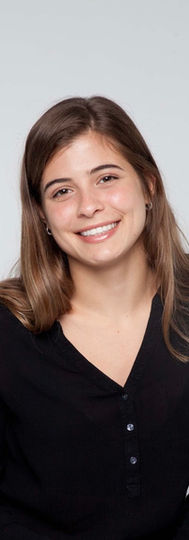NEXT STEPS
FIRE prepares you to take fearless next steps after you complete our experience.
What happens after I complete FIRE?
FIRE students are strongly positioned to transition to next steps in their professional development after completing the FIRE 3 semester experience. In addition to the technical skills you have gained, FIRE students are career ready.
Use these resources as a guide for thinking about your next step.
Reflecting on your FIRE Experience
Undergraduate researchers develop a multitude of skills during their time in FIRE. When reflecting on your own skill development, it may be helpful to conceptualize skills as being related to developing "research products" or understanding "research processes."
Research-Product Oriented Skills
Research-Process Oriented Skills
Take Note:
Jot down what product-oriented and process-oriented skills you have developed in FIRE. Beside each skill, note an example of how you developed that skill. Consider which skills may be relevant in future opportunities you wish to pursue.
Similarly, the National Association of Colleges & Employers (NACE) outlines the competencies for career readiness as...
Critical Thinking
Identify and respond to needs based upon an understanding of situational context and logical analysis of relevant information.
Communication
Clearly and effectively exchange information, ideas, facts, and perspectives with persons inside and outside of an organization.
Teamwork
Build and maintain collaborative relationships to work effectively toward common goals, while appreciating diverse viewpoints and shared responsibilities.
Leadership
Recognize and capitalize on personal and team strengths to achieve organizational goals.
Technology
Understand and leverage technologies ethically to enhance efficiencies, complete tasks, and accomplish goals.
Professionalism
Knowing work environments differ greatly, understand and demonstrate effective work habits, and act in the interest of the larger community and workplace.
Career &
Self-Development
Proactively develop oneself and one’s career through continual personal and professional learning, awareness of one’s strengths and weaknesses, navigation of career opportunities, and networking to build relationships within and without one’s organization.
Equity & Inclusion
Demonstrate the awareness, attitude, knowledge, and skills required to equitably engage and include people from different local and global cultures. Engage in anti-oppressive practices that actively challenge the systems, structures, and policies of racism and inequity.
Take Note:
Note which of these competencies you feel you have developed during your FIRE Experience. Beside each competency, note an example of how you developed that competency.
For example, perhaps you developed competency in Digital Technology through your experience wrangling data and using newly emerging AI algorithms to analyze data.
Preparing For Your Next Step
Resumes are typically tailored one-page documents outlining your work experience relevant to the internship or opportunity to which you are applying. A curriculum vitae or “CV” is a longer, comprehensive document outlining your academic experiences thus far. These often include subsections like “Education”, “Research”, “Publications”, “Presentations”, and “Service.”
The Career Center and President’s Promise Office provide resources and Canvas modules on CVs and Resumes.
On both CVs and resumes, you can (and should) include your FIRE experience. Here are a few examples of how FIRE Alumni have included FIRE on their respective documents.
FIRE Alumni Resume Examples




Leveraging your FIRE Network
Developing Materials
Find as many opportunities to network as you can!
These opportunities can occur at research-centered events like conferences or Undergraduate Research Day. During events, do your best to connect with people in the field in which you are interested and let them know you are looking for opportunities. Carry around business cards (physical or QR code) or a resume to share with colleagues. Make a good first impression.
Develop your online presence to extend your network. Develop and keep profiles up-to-date on websites like LinkedIn, Research Gate, ORIC iD, or any other discipline-specific websites.
You can also build networks in your day-to-day life here at UMD. Network with peers in courses or extra-curricular meetings - your peers now will be experts in their fields at some point in the future! Additionally, build and maintain relationships with faculty members on campus. An excellent way to develop and foster connections with faculty members is by visiting your professors during office hours. FIRE faculty members would always appreciate you stopping in to let them know what you’re up to after FIRE.
FINDING YOUR NEXT STEP
Many opportunities are available at UMD and beyond that FIRE students are uniquely positioned to consider. These include research, internships, campus engagement, community engagement opportunities, and more.
What were FIRE Alumni's next steps?
Research Opportunities
Interested in continuing research after FIRE? Many resources and opportunities are out there - the challenge is finding the opportunity that aligns with your interests and goals.
Reflect:
What are you interested in pursuing as a career? What are your personal and professional goals?
How might skills you developed in research advance you toward your goals?
What research topics or questions do you have after FIRE? Are there subject areas you want to learn more about?
Check in with your FIRE Faculty Mentor:
What suggestions do they have for continuing research (in FIRE, at UMD, beyond?)
Share with them your self-evaluated strengths and skills. Ask for feedback from their experience working with you.
Staying Connected to the FIRE Community
During your time in FIRE you have built numerous connections with peers and faculty members. You may be wondering how you can stay connected to the members of your FIRE community and the larger research community at UMD.
To keep up with all things FIRE, follow us on Instagram at @umd_fire. This is where all FIRE events and updates are posted regularly.
Keep up to date on undergraduate research activities, events, and announcements by following the Office of Undergraduate Research on Instagram @umd_our.
You may also stay connected to the FIRE community by serving on the Student Leadership Council or by serving as a peer research mentor for your FIRE stream.










